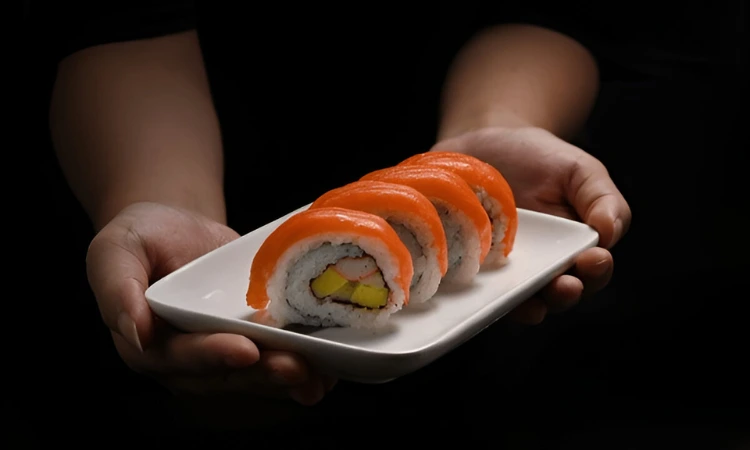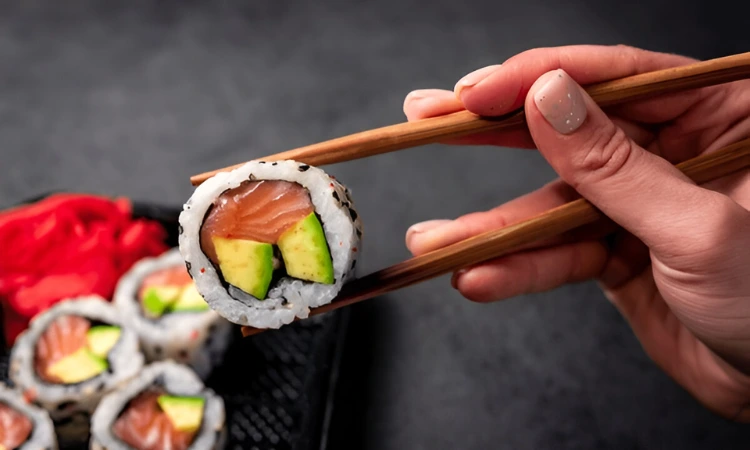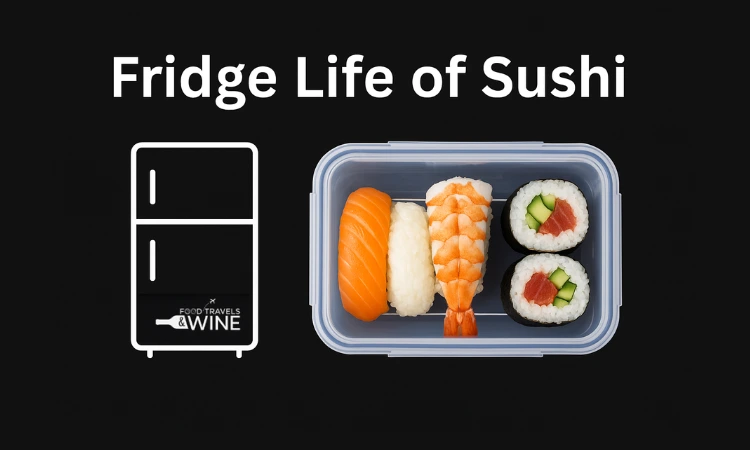How long can sushi last in the fridge? Every sushi lover asks this question after bringing home leftovers. Leftover sushi stays safe in the fridge for up to 48 hours.
Sushi is delicate, and its shelf life depends heavily on how it’s stored and what ingredients it contains.
While it might still look good, eating old sushi can be risky. Each type has its own fridge timeline, from raw fish to veggie rolls.
Understanding how long sushi lasts and when it’s no longer safe is key to protecting your health.
In this FTW food guide, we’ll discuss sushi shelf life and smart storage tips to keep leftovers fresh and safe.
General Sushi Shelf Life:
Sushi shelf life depends on ingredients. Let’s break down how long different types of leftover sushi really last.

Raw Fish Sushi
Raw fish sushi usually lasts up to 24 hours when refrigerated properly.
Cooked Sushi
Cooked sushi like shrimp or crab rolls can last up to 2–3 days in the fridge.
Veggie Sushi
Veggie rolls without seafood stay fresh for about 3–5 days if stored in airtight containers.
Storage Techniques for Leftover Sushi:
Proper storage is key to keeping leftover sushi fresh. To extend sushi storage time safely, follow these tips on fridge temperature, containers, and rice texture.
Fridge Temperature
Keep your fridge between 32°F and 38°F to refrigerate sushi safely.
Airtight Containers
Use airtight containers to prevent moisture loss and avoid sushi drying out.
Sushi Rice Texture
Sushi rice hardens in the fridge; eat leftovers within the recommended storage time.
Sushi Types Comparison: Shelf Life and Storage
Different sushi types have varying shelf lives due to their ingredients and preparation.
Understanding these differences helps ensure food safety and avoid spoilage. For proper storage, let’s compare maki, nigiri, sashimi, and tempura rolls.
Maki
Maki rolls, wrapped in seaweed and filled with fish or veggies, generally last 24 to 48 hours refrigerated.
Seaweed may become soggy, but proper airtight storage can extend its freshness. Always check for off smells or sliminess to ensure safety.
Nigiri
Nigiri sushi features raw fish on vinegared rice. Because of the raw fish, it’s highly perishable and should be eaten within 24 hours.
Store in airtight containers and refrigerate below 38°F to minimize bacteria growth and maintain freshness.
Sashimi
Sashimi is thinly sliced raw fish served without rice. It’s the most delicate sushi type and should be consumed within 24 hours of purchase.
Because it does not contain rice, it’s prone to drying out quickly but must always be stored chilled for food safety.
Tempura Rolls
Tempura rolls contain fried ingredients and are more resilient, lasting up to 2 days refrigerated. However, the fried texture softens over time.
For best taste, eat as soon as possible, and always store in airtight containers to prevent sogginess and bacterial growth.
How to Tell if Sushi Has Gone Bad?

Knowing the signs sushi has gone bad is crucial for your health.
- If leftover sushi smells sour, fishy, or off, it’s a clear red flag.
- Color changes, like dull or grayish fish, indicate spoilage.
- Slimy, sticky, or mushy rice and fish texture mean it’s time to toss it.
- Fresh sushi should look vibrant and smell clean.
Trust your senses and don’t risk eating sushi past its safe storage time. These sushi gone bad signs help ensure you avoid food poisoning and enjoy sushi safely every time. Follow proper sushi food safety guidelines to prevent health issues.
Can You Freeze Sushi?
In short, can you freeze sushi? Technically, yes, but it’s not ideal for taste or texture.
Safety Concerns & Taste Issues while freezing sushi:
Freezing sushi is generally not recommended due to safety and quality concerns. Raw fish sushi can develop texture changes and freezer burn, which affects taste and mouthfeel.
While freezing may slow sushi bacterial growth, it doesn’t guarantee food safety once thawed. If you must freeze sushi, do so immediately after purchase and consume within a week.
Ingredients to Consider while freezing sushi:

Ingredients like avocado and mayo don’t freeze well—they tend to become mushy or separate after thawing. This impacts sushi freshness and flavor significantly.
Refrigeration is preferred for best practices for storing sushi overnight or longer. You can refrigerate sushi safely for up to 24 hours, but beyond that, freshness and safety decline.
Always check for signs of spoilage to avoid risks. For a sushi expiration guide, trust your senses and store sushi properly.
Sushi Fridge Life Vs Freezer Life:
Sushi safely lasts up to 24 hours in the fridge, preserving its texture and flavor.
Freezing sushi can extend storage but often ruins the rice and delicate ingredients, especially avocado and mayo.
For best taste and safety, refrigerate sushi rather than freezing it.
Tips For Homemade Sushi Storage:
When I make sushi at home, storing it properly is key to enjoying it later. I always let the sushi cool to room temperature before refrigerating it—that helps keep the rice from getting too complicated.
I use airtight containers to lock in freshness and prevent the sushi from drying out. If I have avocado or mayo inside, I try to eat those rolls within a day because they spoil faster.
Also, I avoid storing sushi at room temperature for long to prevent bacterial growth. From experience, eating homemade sushi within 24 hours gives the best taste and safety.
Ideal Refrigerated Sushi Temperature:

The ideal refrigerated temperature for storing sushi is between 32°F (0°C) and 38°F (3°C). This range slows bacterial growth while preserving raw fish and rice’s delicate texture and flavor.
Temperatures above 40°F (4°C) increase the risk of foodborne illness, while freezing below 0°F (-18°C) can damage sushi quality.
Use a reliable fridge thermometer to maintain this safe temperature zone for optimal sushi storage.
What You Need to Know to Avoid Sushi Bacteria Risk?
If not stored properly, raw fish sushi can harbor harmful bacteria like Listeria and Salmonella. Eating spoiled sushi risks food poisoning, which can cause nausea, cramps, or worse.
To stay safe, always refrigerate sushi below 38°F, consume leftovers quickly, and watch for signs of spoilage. Prioritizing sushi safety protects your health without sacrificing flavor or enjoyment.
FAQs Related to How Long Can Sushi Last in the Fridge?
Can I eat sushi after 2 days?
For safety, it’s best to eat sushi within 24 hours. After 2 days, the risk of bacteria increases, so avoid eating it.
How long does store-bought sushi last?
Store-bought sushi usually lasts up to 24 hours refrigerated. Always check the sell-by date and keep it properly chilled.
Can I leave sushi out overnight?
Never leave sushi out overnight. Room temperature encourages rapid bacterial growth, making it unsafe to eat.
How long is sushi good after purchase?
If refrigerated, sushi is good for about 24 hours after purchase. Consume it as soon as possible for the best freshness.
How to reheat leftover sushi rice?
Gently steam or microwave sushi rice with a damp paper towel to keep it moist. Avoid overheating to prevent dryness.
Can you eat 3 day old sushi?
Eating sushi after 3 days is unsafe due to spoilage and bacteria growth. Always stick to the 24-hour rule.
How long can raw sushi last in the fridge?
Raw sushi should be consumed within 24 hours and refrigerated. Longer storage increases health risks and degrades quality.
How to tell if leftover sushi is bad?
Check for sour smell, discoloration, or slimy texture. If any signs appear, discard the sushi immediately.
Can you eat sushi rice after 2 days?
Sushi rice can spoil quickly; eating it after 2 days is not recommended due to the risk of bacteria. Fresh rice is the safest option.
How to keep sushi fresh overnight?
To maintain freshness, store sushi in an airtight container in the fridge at or below 38°F. Avoid exposure to air.
Final Thoughts:
As a chef trained in sushi preparation, I always say: “If sushi smells off, it is off—don’t risk it.”
Follow proper storage rules, keep sushi below 38°F, and consume it quickly. Even the best sushi quickly loses quality.
Respect the sushi shelf life, trust your senses, and when in doubt, throw it out. Safe sushi is delicious sushi.

